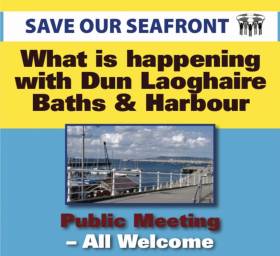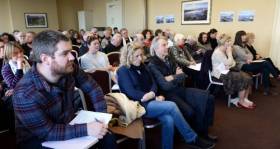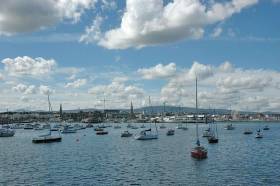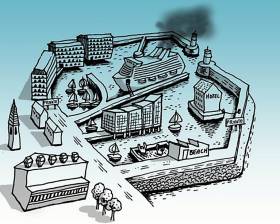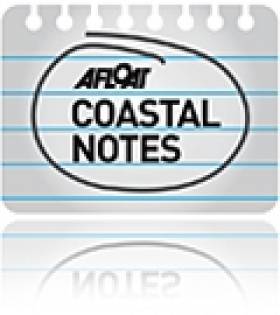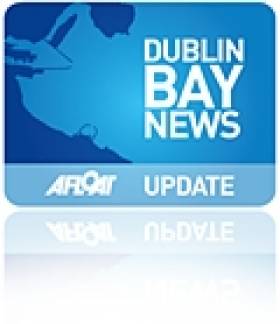Displaying items by tag: Save Our Seafront
Save Our Seafront Holding Public Meeting on Ireland’s Sustainable Future
Dun Laoghaire campaign group Save Our Seafront is holding a public meeting at the Royal Marine Hotel on Monday 1 November on the topic of Ireland’s sustainable future.
From 7.30pm all are welcome to join the discussion on how Ireland can best protect its marine resources while simultaneously developing renewable resources in a sustainable and responsible way.
Speakers will include Richard Boyd Barrett TD, Fergal McLoughlin of An Taisce and Valerie Freeman of the Coastal Concern Alliance.
Attendees are also welcome to join remotely via Zoom; register for the access details HERE.
 A Save Our Seafront poster advertising the public meeting at 7.30pm on November 1st at the Royal Marine Hotel
A Save Our Seafront poster advertising the public meeting at 7.30pm on November 1st at the Royal Marine Hotel
Dun Laoghaire Seafront Campaigners To Hold Public Meeting On Future Of Baths & Harbour
Dun Laoghaire campaign group Save Our Seafront will hold a public meeting next Monday 28 January to discuss ongoing and future plans for Dun Laoghaire Harbour, including its baths restoration project.
The meeting is scheduled for 8pm next Monday night at the Royal Marine Hotel and speakers will include Richard Boyd Barrett TD, Councillor Melisa Halpin and Fergal McLoughlin of An Taisce.
For further information find ‘Save Our Seafront - Dun Laoghaire’ on Facebook or contact [email protected]. The new Save Our Seafront website is at SaveOurSeafront.com.
Objections of Nearly 300 to Bulloch Harbour Development Plan
#BullochHarbour - Submissions totalling 283 writes The Irish Times have been filed on a controversial development proposed for one of south Dublin’s most popular coastal inlets.
The Bulloch Harbour planning application would see a mixed-use development of commercial and residential buildings on the seafront.
Hostile public reaction immediately followed its filing in December, with meetings and an opposition campaign as covered on Afloat were quickly organised.
The Dún Laoghaire-Rathdown County Council planning department was still processing objections and observations over the weekend following last Thursday’s deadline.
A decision is expected in March. For more on the story click here.
#CruiseBerth - The Save-Our-Seafront Dun Laoghaire group was yesterday granted leave by the High Court to challenge An Bord Pleanala’s decision to approve cruiseships docking in the local harbour.
As The Irish Times reports, the group, which is an environmental non-governmental organisation chaired by local TD Richard Boyd Barrett, claimed that the environmental effect of the proposed cruise berths were not adequately assessed by the Board.
Mr Justice Max Barrett granted the group leave to judicially review the Board’s decision on a number of grounds.
The court heard that independent environmental impact studies were inadequate and as a result the Board had not lawfully discharged its obligations under Irish and European planning laws.
Counsel for the group said the Board should have conducted an independent and separate assessment before having given its decision without merely relying on the information provided by the Dun Laoghaire Harbour Company.
The court heard there had been a failure by the Board to conduct surveys relating to the effects on summer and winter birds and the impact on the Minke Whale population, a species listed in the Habitats Directive, and as a result of which its decision was further flawed.
Mr Justice Barrett heard that the harbour company proposed to dump the dredge spoil from the navigation channel into the sea on the Burford Bank which was within the Rockabill to Dalkey Island special area of conservation, an off shore reef vulnerable to toxins.
The group also alleged that given the toxic profile of the dredge spoil the harbour board was obliged to consider the impact of the dumping of spoil in all local special areas of conservation in Dublin Bay and Rockabill which it had not done.
It stated in an affidavit that the harbour company had failed to consider the cumulative effects on marine mammals or sea birds from other proposed or permitted developments within Dublin Bay.
The newpaper has more on the story here.
#DunLaoghaire - Close to 100 people attended a meeting last night (Thursday 27 October) in the Royal Marine Hotel organised by the Save Our Seafront (SOS) community group, writes our special correspondent.
SOS campaigns for the public interest in the foreshore of Dun Laoghaire and against what they believe to be the inappropriate developments proposed by the authorities with responsibility for the coastal aspects of the harbour and the borough.
An imminent decision by An Bord Pleanala on the Dun Laoghaire Harbour Company’s (DLHC) application to develop a major cruise liner terminal in the harbour was a significant factor in the discussion.
But the general sentiment was that no matter what the outcome, DLHC’s finances are widely believed to be in such a position that development would not be possible.
The alleged lack of fiscal responsibility by the DHLC was referred to repeatedly by the top table and from the floor.
Dun Laoghaire-Rathdown councillors were not spared criticism, either, as several participants noted Cllr Melisa Halpin was the only one of the 40 elected representatives in attendance.
The recent pronouncement in the Senate by Transport Minister Shane Ross that a transfer of the responsibilities of DLHC was imminent was linked by Richard Boyd Barrett TD to the delay in the planning decision, when he said: “After five years in the Dáil, I don't believe in coincidences anymore.”
The meeting encouraged participants to lobby their councillors to vote for a complete takeover of the DLHC by the council, rather than the ‘quango’ option whereby the DLHC would remain as an entity within the council structure.
All types of harbour users were present at the meeting, many of whom were sailors.
Speakers concurred that the future of the harbour lay in water sports and in the wider maritime heritage sector, partially supported by smaller commercial activity than that envisaged by the DLHC.
With An Bord Pleanala due to give its decision on permission for a giant cruise liner berth in Dun Laoghaire Harbour in the coming weeks after almost a year of delays, the Save Our Seafront movement is pulling out all the stops in its continuing opposition writes W M Nixon.
A Public Meeting is scheduled for the Kingstown Suite in the Royal Marine Hotel on Thursday 27th October at 7.00pm, and speakers including Richard Boyd Barrett TD and Cllr Melissa Halpin will outline the two main options for the Government as the SOS movement sees it.
According to SOS, Minister for Transport Shane Ross - in conjunction with Dun Laoghaire Rathdown County Council - will have to choose between trying to continue with the existing Harbour Company as a commercial quango only nominally under the control of the council, or alternatively they can choose to dissolve the Harbour Company and bring the harbour under the full democratic control of the Council.
Save Our Seafront are totally in favour of the second option, and in support of this, they have issued a very hard-hitting statement giving detailed criticism of many aspects of the administration of the Harbour Company.
Looking to the future, they hope to see Dun Laoghaire Harbour moving forward with the establishment of a public national watersports centre and a Diaspora Museum, with the harbour protected as a fully public amenity accessible to all.
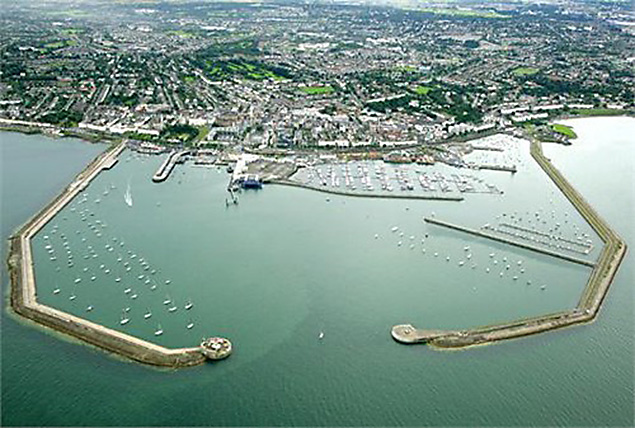 Dun Laoghaire Harbour as it is today, with an attractive mix of fully sheltered berthing and semi-sheltered sailing space ideal for training, fresh air and a mood of spiritual uplift. Photo: Peter Barrow
Dun Laoghaire Harbour as it is today, with an attractive mix of fully sheltered berthing and semi-sheltered sailing space ideal for training, fresh air and a mood of spiritual uplift. Photo: Peter Barrow
Dublin Bay Oilwatch Q&A Information Workshop
#DalkeyIslandPROSPECT – An Oilwatch Q&A Information Workshop, about the issues of drilling for oil and gas in Dublin Bay will be held this Sunday (3 February) between 1-5pm in the Kingston Hotel, Dun Laoghaire.
A panel of speakers will present the following topics; oil industry, financial reward, legal matters and the environment. The event is organised by Save Our Seafront and with the support of other groups. All are welcome to the event, for further details click HERE.
As previously reported on Afloat.ie, the issue of a Foreshore Licence granted to Providence Resources for the Dalkey Island 'Prospect' is the subject of a judicial review that An Taisce will be bringing to the High Court on 19 February.
Save Our Seafront Host Public Meeting in Dun Laoghaire Tonight
#DUN LAOGHAIRE NEWS - Save Our Seafront will hold a public meeting this evening Thursday 4 October at The Kingston Hotel in Dun Laoghaire to discuss a number of issues such as the redevelopment of the harbour baths, the demolition of Blackrock Baths and repairs at Coliemore Harbour.
The South Dublin campaign group - featuring People Before Profit Alliance TD Richard Boyd Barrett and Dun Laoghaire-Rathdown Councillor Melisa Halpin - has circulated a newsletter outlining its position on these concerns.
Among its claims is that Dun Laoghaire-Rathdown County Council (DLRCC) wants to abandon its previous commitments to provide a public swimming pool on the site of the historic Victorian sea baths, opting instead for a €1.5 million 'Badeschiff' or floating pool in the harbour with no permanent construction.
The group also describes as a "disgrace" the abandonment of the Blackrock Baths site, which faces imminent demolition due to public health and safety concerns, and takes issue with DLRCC councillors' apparent declaration that Coliemore Harbour in Dalkey - the main departure point for boat trips to Dalkey Island - is unsafe for passenger boats.
The public meeting under the title 'What Is Happening To Our Seafront?' takes place tonight at 8pm in The Kingston Hotel on Haddington Terrace.


























